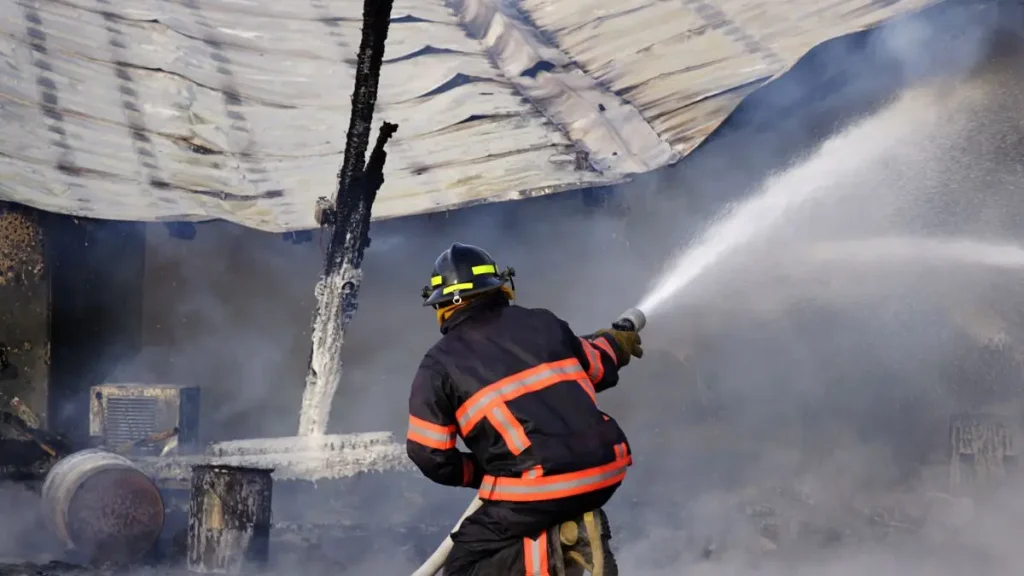Alpine Township Mobile Home Fire Leaves 85-Year-Old Dead
I’ll never forget the first time I read about this fire. It was just after 4:30 a.m. when a mobile home in Alpine Meadows, Alpine Township, erupted in flames. I imagine the chaos—the smell of smoke, the orange glow cutting through the early morning darkness.
The home belonged to Stanley Vandenboss, an 85-year-old man who lived quietly in the community. By the time firefighters arrived, the situation was already critical.
I can’t help but think about what it must have felt like for his neighbor, who saw the smoke and rushed to help, only to be stopped by the thick, choking air. You start to realize how fast these things can escalate.
The fire quickly consumed the home, and even with the swift response from Alpine Township and Walker Fire Departments, Stanley was pulled out in critical condition and later passed away.
This section isn’t just about reporting facts—it’s about understanding the human stakes. Fires don’t wait, and one moment of inattention can have irreversible consequences. For anyone reading this, take a second to think about your own space: Are your smoke detectors working? Do you have a plan if something like this happens in your home?
Heroic Attempt — Neighbor Tries to Rescue Victim
I can’t stop thinking about the courage it takes to run into a burning home. That morning, a neighbor spotted smoke and flames climbing from Stanley Vandenboss’s mobile home. According to WWMT, he immediately called 911 and tried to get inside to help. But the smoke was thick, blinding, and dangerous, forcing him to retreat before firefighters arrived.
It’s hard to imagine standing there, knowing someone’s life is in danger, and being blocked by smoke you can’t see through. Moments like these make the risk real for everyone—not just the victim, but the people trying to help.
This neighbor’s attempt, even if it didn’t succeed, reminds us how important it is to pay attention to our surroundings and respond quickly when danger arises.
Firefighting Response and Rescue Efforts

Firefighters arrived fast, but even speed can’t always prevent tragedy. Wood TV reports that the Alpine Township Fire Department and Walker Fire Department, along with other local teams, rushed to the scene.
They found Stanley Vandenboss in critical condition and pulled him from the burning home. He was immediately transported to the hospital, but sadly, he later died from cardiac arrest caused by smoke inhalation.
Even with functioning smoke detectors, which the home reportedly had, this fire shows how unpredictable and deadly these situations can be. Every second counts when flames spread, and the emergency response teams put themselves in harm’s way to try to save a life.
Their dedication is a stark reminder that fires are not just property damage—they’re life-and-death events that demand preparation and vigilance.
Medical Response — Cardiac Arrest and Smoke Inhalation
Once Stanley was in the hospital, medical teams faced the severe effects of smoke inhalation. Smoke can silently poison the body, causing cardiac arrest, lung damage, and other complications even when flames don’t touch you.
In his case, the combination of toxic smoke and early morning timing left little chance for recovery, despite rapid treatment.
Reading about incidents like this makes you realize that fire danger is about more than flames. Even if you wake up to smoke alarms, the toxic gases from a small fire can incapacitate someone in minutes.
Fires, even in different states like the North Bend explosion, show how quickly smoke and heat can overwhelm residents and require immediate medical intervention.
For those of us with elderly family members or anyone with breathing issues, this is a chilling reminder: preparation and fast action aren’t optional—they’re essential.
Investigation — Determining the Fire’s Cause
Authorities are working to understand exactly how this fire started. The Kent County Sheriff’s Office, Plainfield Township Fire Department, and Michigan State Police are all involved in the investigation. Right now, the cause remains undetermined.
While it may feel distant when reading about a neighbor’s tragedy, these investigations are critical. They uncover what went wrong and help prevent similar incidents in the future.
For everyone living in Alpine Township—or in any community with older homes or mobile homes—this is a reminder to check wiring, heating systems, and smoke detectors. You never know what small oversight could escalate into disaster.
Similar investigations have occurred across the country, such as a Colorado home that caught fire few days ago, highlighting how authorities work to determine causes and prevent future tragedies.”
Community and Public Response
Even in the middle of tragedy, there’s a powerful sense of community. Officials expressed their condolences to Stanley Vandenboss’s family, and neighbors are offering support however they can.
Fire Chief Rusty Shoultz pointed out that smoke detectors still saved lives in this fire by alerting people early, emphasizing the importance of Fire Prevention Week, which encourages families to check their detectors and safety equipment.
This part of the story is about more than mourning—it’s about learning and preparing. It’s about taking steps so that if a fire happens in your home, your family has a chance to escape safely.
When I think about it, it’s a call to action: make sure your detectors work, keep exits clear, and have a plan ready. These small steps can mean the difference between life and death.
Fire departments often urge vigilance, as seen in Brownsville where firefighters investigated a blaze at an abandoned home, reinforcing the importance of awareness and preventive measures in every neighborhood.
Practical Fire Safety Tips for Mobile Home Residents

Reading about Stanley Vandenboss’s fire makes you think: what would I do if something like this happened in my home? There are some practical steps you can take today. First, make sure your smoke detectors are working.
Test them monthly and replace batteries at least once a year. Even a small, functional alarm can give you crucial seconds to escape.
Second, plan your escape routes. Walk through your home and identify at least two ways out from every room. Make sure hallways are clear, doors aren’t blocked, and windows open easily. Practice this plan with your family so everyone knows what to do in an emergency.
Finally, keep fire extinguishers accessible, and know how to use them. Fires can spread faster than you think, and having the right tools—and the knowledge to use them—can stop a small fire from becoming a tragedy. These steps aren’t difficult, but they can make a life-or-death difference.
Many residents also share fire safety tips and quick alerts through community groups on WhatsApp—joining a local safety group can be a great way to stay informed and get instant updates.
Fire Prevention Week and Community Awareness
Fire Chief Rusty Shoultz highlighted the importance of Fire Prevention Week in this case. Across Michigan, fire departments are using this week to remind residents to check smoke detectors, clear escape routes, and talk about fire safety at home.
Community awareness plays a huge role in preventing tragedies. When neighbors are alert and prepared, when families take a few simple precautions, the chances of a fatal outcome drop dramatically.
Sharing safety tips, checking on elderly residents, and staying vigilant can create a safer environment for everyone. The tragedy in Alpine Township shows how quickly things can escalate—but it also shows the power of preparation and awareness.
Lessons Learned and Takeaways
After reading about this fire, I couldn’t help but reflect on the lessons it leaves behind. Fires don’t announce themselves; they happen fast, silently, and with devastating consequences. But there’s also hope. Smoke detectors, rapid emergency response, and community vigilance save lives.
For you, the takeaway is simple: don’t wait to be a victim. Test your alarms, review your escape plan, and talk with your family about what to do in an emergency. Check on neighbors, especially those who may need extra help. And remember, every small step you take toward preparedness counts.
Tragedies like Stanley Vandenboss’s death are heartbreaking, but they remind us why awareness, planning, and action are not optional—they’re essential.
Before you leave this article, take a moment to ask yourself: when was the last time I tested my smoke detectors or reviewed my home escape plan? It’s never too late to make your home safer.
For more stories on home safety and fire prevention, check out our Home Incidents section—there’s plenty of practical advice to help you protect your family.
Disclaimer: The information in this article is for educational and awareness purposes only. It is based on verified news reports and expert guidance but should not replace professional advice. Always follow local safety regulations and consult authorities for emergency preparedness.


